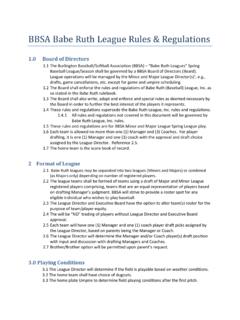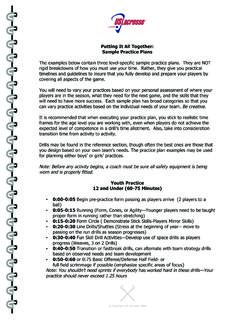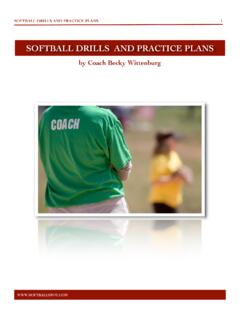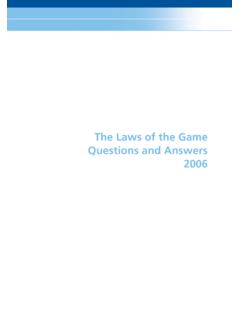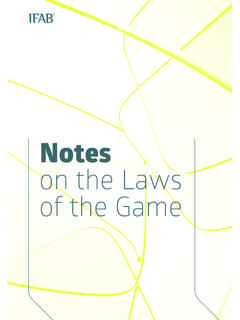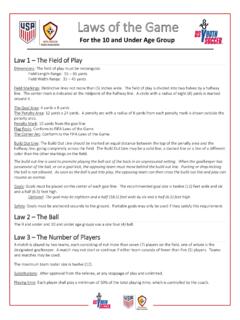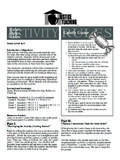Transcription of Interpretation of the Laws of the Game and Guidelines for ...
1 57. Interpretation of the laws of the Game and Guidelines for Referees LAW 12 FOULS AND MISCONDUCT 111. Basic requirements for a foul The following conditions must be met for an offence to be considered a foul: it must be committed by a player it must occur on the field of play it must occur while the ball is in play If the referee stops play due to an offence committed outside the field of play (when the ball is in play), play must be restarted with a dropped ball from the position of the ball when play was stopped, unless play was stopped inside the goal area, in which case the referee drops the ball on the goal area line parallel to the goal line at the point nearest to where the ball was located when play was stopped. Careless, reckless, using excessive force Careless means that the player has shown a lack of attention or consideration when making a challenge or that he acted without precaution.
2 No further disciplinary sanction is needed if a foul is judged to be careless Reckless means that the player has acted with complete disregard to the danger to, or consequences for, his opponent. A player who plays in a reckless manner must be cautioned Using excessive force means that the player has far exceeded the necessary use of force and is in danger of injuring his opponent. A player who uses excessive force must be sent off Charging an opponent The act of charging is a challenge for space using physical contact within playing distance of the ball without using arms or elbows. It is an offence to charge an opponent: in a careless manner in a reckless manner using excessive force 112 LAW 12 FOULS AND MISCONDUCT. Holding an opponent Holding an opponent includes the act of preventing him from moving past or around using the hands, the arms or the body. Referees are reminded to make an early intervention and to deal firmly with holding offences especially inside the penalty area at corner kicks and free kicks.
3 To deal with these situations: the referee must warn any player holding an opponent before the ball is in play caution the player if the holding continues before the ball is in play award a direct free kick or penalty kick and caution the player if it happens once the ball is in play If a defender starts holding an attacker outside the penalty area and continues holding him inside the penalty area, the referee must award a penalty kick. Disciplinary sanctions A caution for unsporting behaviour must be issued when a player holds an opponent to prevent him gaining possession of the ball or taking up an advantageous position A player must be sent off if he denies an obvious goalscoring opportunity by holding an opponent No further disciplinary action must be taken in other situations of holding an opponent Restart of play Direct free kick from the position where the offence occurred (see Law 13.)
4 Position of free kick) or a penalty kick if the offence occurred inside the penalty area LAW 12 FOULS AND MISCONDUCT 113. Handling the ball Handling the ball involves a deliberate act of a player making contact with the ball with his hand or arm. The referee must take the following into consideration: the movement of the hand towards the ball (not the ball towards the hand). the distance between the opponent and the ball (unexpected ball). the position of the hand does not necessarily mean that there is an infringement touching the ball with an object held in the hand (clothing, shinguard, etc.). counts as an infringement hitting the ball with a thrown object (boot, shinguard, etc.) counts as an infringement Disciplinary sanctions There are circumstances when a caution for unsporting behaviour is required when a player deliberately handles the ball, when a player: deliberately and blatantly handles the ball to prevent an opponent gaining possession attempts to score a goal by deliberately handling the ball A player is sent off, however, if he prevents a goal or an obvious goalscoring opportunity by deliberately handling the ball.
5 This punishment arises not from the act of the player deliberately handling the ball but from the unacceptable and unfair intervention that prevented a goal being scored. Restart of play Direct free kick from the position where the offence occurred (see Law 13 . Position of free kick) or penalty kick Outside his own penalty area, the goalkeeper has the same restrictions on handling the ball as any other player. Inside his own penalty area, the goalkeeper cannot be guilty of a handling offence incurring a direct free kick or any misconduct related to handling the ball. He can, however, be guilty of several handling offences that incur an indirect free kick. 114 LAW 12 FOULS AND MISCONDUCT. Offences committed by goalkeepers A goalkeeper is not permitted to keep control of the ball in his hands for more than six seconds. A goalkeeper is considered to be in control of the ball: while the ball is between his hands or between his hand and any surface ( ground, own body).
6 While holding the ball in his outstretched open hand while in the act of bouncing it on the ground or tossing it into the air When a goalkeeper has gained possession of the ball with his hands, he cannot be challenged by an opponent. A goalkeeper is not permitted to touch the ball with his hand inside his own penalty area in the following circumstances: if he handles the ball again after it has been released from his possession and has not touched any other player: the goalkeeper is considered to be in control of the ball by touching it with any part of his hands or arms except if the ball rebounds accidentally from him, after he has made a save possession of the ball includes the goalkeeper deliberately parrying the ball if he touches the ball with his hands after it has been deliberately kicked to him by a team-mate if he touches the ball with his hands after he has received it directly from a throw-in taken by a team-mate Restart of play Indirect free kick from the position where the offence occurred (see Law 13 Position of free kick).
7 LAW 12 FOULS AND MISCONDUCT 115. Offences committed against goalkeepers It is an offence for a player to prevent a goalkeeper from releasing the ball from his hands A player must be penalised for playing in a dangerous manner if he kicks or attempts to kick the ball when the goalkeeper is in the process of releasing it It is an offence to restrict the movement of the goalkeeper by unfairly impeding him, at the taking of a corner kick Playing in a dangerous manner Playing in a dangerous manner is defined as any action that, while trying to play the ball, threatens injury to someone (including the player himself). It is committed with an opponent nearby and prevents the opponent from playing the ball for fear of injury. A scissors or bicycle kick is permissible provided that, in the opinion of the referee, it is not dangerous to an opponent. Playing in a dangerous manner involves no physical contact between the players.
8 If there is physical contact, the action becomes an offence punishable with a direct free kick or penalty kick. In the case of physical contact, the referee should carefully consider the high probability that misconduct has also been committed. Disciplinary sanctions If a player plays in a dangerous manner in a normal challenge, the referee should not take any disciplinary action. If the action is made with obvious risk of injury, the referee should caution the player If a player denies an obvious goalscoring opportunity by playing in a dangerous manner, the referee should send off the player 116 LAW 12 FOULS AND MISCONDUCT. Restart of play Indirect free kick from the position where the offence occurred (see Law 13 Position of free kick). If there is contact, a different offence has been committed, punishable by a direct free kick or penalty kick. Impeding the progress of an opponent Impeding the progress of an opponent means moving into the path of the opponent to obstruct, block, slow down or force a change of direction by an opponent when the ball is not within playing distance of either player.
9 All players have a right to their position on the field of play, being in the way of an opponent is not the same as moving into the way of an opponent. Shielding the ball is permitted. A player who places himself between an opponent and the ball for tactical reasons has not committed an offence as long as the ball is kept within playing distance and the player does not hold off the opponent with his arms or body. If the ball is within playing distance, the player may be fairly charged by an opponent. Delaying the restart of play to issue a card Once the referee has decided to issue a card, whether to caution or send off a player, play must not be restarted until the sanction has been administered. LAW 12 FOULS AND MISCONDUCT 117. Cautions for unsporting behaviour There are different circumstances when a player must be cautioned for unsporting behaviour, if a player: commits in a reckless manner one of the seven offences that incur a direct free kick commits a foul for the tactical purpose of interfering with or breaking up a promising attack holds an opponent for the tactical purpose of pulling the opponent away from the ball or preventing the opponent from getting to the ball handles the ball to prevent an opponent gaining possession or developing an attack (other than the goalkeeper within his own penalty area).
10 Handles the ball in an attempt to score a goal (irrespective of whether or not the attempt is successful). attempts to deceive the referee by feigning injury or pretending to have been fouled (simulation). changes places with the goalkeeper during play or without the referee's permission acts in a manner which shows a lack of respect for the game plays the ball when he is walking off the field of play after being granted permission to leave the field of play verbally distracts an opponent during play or at a restart makes unauthorised marks on the field of play uses a deliberate trick while the ball is in play to pass the ball to his own goalkeeper with his head, chest, knee, etc. in order to circumvent the Law, irrespective of whether the goalkeeper touches the ball with his hands or not. The offence is committed by the player in attempting to circumvent both the letter and the spirit of Law 12 and play is restarted with an indirect free kick uses a deliberate trick to pass the ball to his own goalkeeper to circumvent the Law while he is taking a free kick (after the player is cautioned, the free kick must be retaken).
